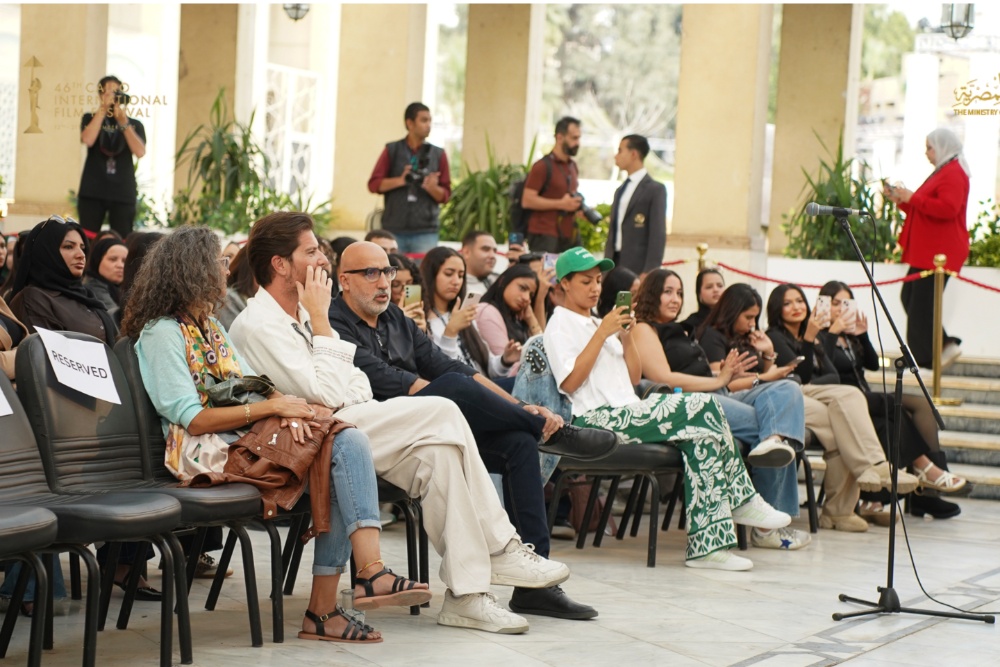At this year’s Cairo Intl. Film Festival, some of the most energized conversations unfolded inside Cairo Industry Days, where co-production emerged as one of the festival’s most strategic themes. Between a candid panel on balancing identity with market demands and the launch of CIFF film market partner Co-Production Salon’s new platform, Project Salon, the festival underscored its commitment to improving regional collaboration and giving Arab filmmakers more structured tools to navigate the international marketplace. During the panel “Co-production: Between Identity and the Market,” filmmakers and producers from across the region and Europe dissected the realities of working across borders. Egyptian producer-director Ali El Arabi (“Captains of Za’atari”) opened with a reminder that co-production isn’t an automatic solution for every project. Its value, he argued, depends on what a filmmaker genuinely needs, whether that’s financing, expertise, or shared creative sensibilities. Others pointed to the stakes behind those decisions. Senior VP of business and content development at Rise Studios Ziad Srouji (“Once Upon a Time in Gaza,” co-producer) stressed that co-production deals must be understood as commercial risks. With markets shifting and budgets tightening, producers are making business decisions as much as artistic ones. Jordanian producer Rula Nasser (“Inshallah a Boy”) added that international partners are not always essential. Some films, especially those by emerging filmmakers, she maintained, thrive precisely because they remain grounded in local contexts. Still, the financing landscape is evolving quickly. Norwegian producer Dyveke Graver (“The Worst Person in the World”) noted that where one or two co-producers once sufficed, today’s projects often rely on four or five partners to cover different territories and secure distribution pathways. Egyptian filmmaker Mayye Zayed described how this complexity can bring creative tension. On her award-winning documentary “Lift Like a Girl,” she received strong interest from European co-producers, but some pushed for rushed schedules or stylistic adjustments that clashed with her slow, observational approach. Eventually, Zayed partnered with producers who understood the film’s rhythm, an experience that strengthened her resolve to protect her vision even when more heavily financed options were on the table. Across the panel, one theme resurfaced often: the importance of establishing a stable core team before expanding into co-production. Nasser emphasized that no matter how many partners are involved, the director-lead producer relationship anchors the film creatively. Graver agreed, arguing that producers should understand the project’s DNA before approaching outside collaborators. As she put it, the right co-producer should be “someone you’d actually want to have dinner with,” a reminder that compatibility matters as much as credentials. Panelists also discussed the political nuances of international funding. Srouji acknowledged that some European cultural funds come with editorial expectations, but they also provide crucial access to festivals, markets, and new audiences. Nasser noted that countries like Jordan often rely on European post-production services out of necessity, but doing so doesn’t necessarily mean surrendering creative identity. Another shared warning: know your contracts. El Arabi spoke bluntly about learning hard lessons on rights and revenue splits, while Nasser admitted she entered her early projects with limited understanding of copyright. The takeaway, echoed by the group, is that legal literacy is now a foundational skill for producers. The room also grappled with why Arab-Arab co-productions remain less common than collaborations with Europe. Nasser offered a lighthearted but telling explanation, saying producers in the region “love each other too much,” leading to disputes over shooting locations, premiere rights, and broadcast priority. In markets with small audiences for independent cinema, these decisions can carry disproportionate weight. Project Salon: A new tool for collaboration The festival’s focus on co-production was amplified by the launch of Project Salon, a digital platform developed by CIFF partner Co-Production Salon, the UAE-based networking hub, on stage at the Cairo Film Market. The tool allows experienced producers to upload comprehensive project materials, including scripts, budgets, schedules, and pitch decks, and to specify the type of partnership they’re seeking, from co-financing to distribution. To ensure professional standards, projects must already have at least 10% of their financing secured and come from producers with at least one commercially released work. In a region where many filmmakers struggle to find the right partners at the right moment, the platform aims to streamline the process. By centralizing pitching, matchmaking, and financing opportunities in one place, Co-Production Salon is positioning itself as a key connector for the Middle East and North Africa industry. Founder Heba Korayem frames it as a way to bridge the gap between creative ambition and market access, helping Arab producers compete more confidently on the international stage. The initiative fits neatly into CIFF’s wider strategy. The Cairo Film Market welcomed more than 20 Arab and international institutions this year, and CIFF recently formalized a strategic partnership with Co-Production Salon to expand MENA co-production opportunities. Together, the panel conversations and new infrastructure reflect an industry at a turning point. Arab producers are pushing for partnerships that protect artistic identity, all while widening international reach. Co-production, once viewed primarily as a funding lifeline, is now being reframed as a strategic tool, one that can both affirm cultural authenticity, as well as unlock new markets. As CIFF invests in platforms and programs that prioritize transparent, equitable collaboration, the region’s filmmaking community appears ready to enter a new phase shaped not by dependency, but by deliberate, confident, and increasingly region-driven co-production.
https://variety.com/2025/film/global/cairo-co-production-project-salon-mena-collaboration-1236589372/
Cairo Film Festival Puts Co-Production in Spotlight as Industry Pushes for Regional Collaboration



